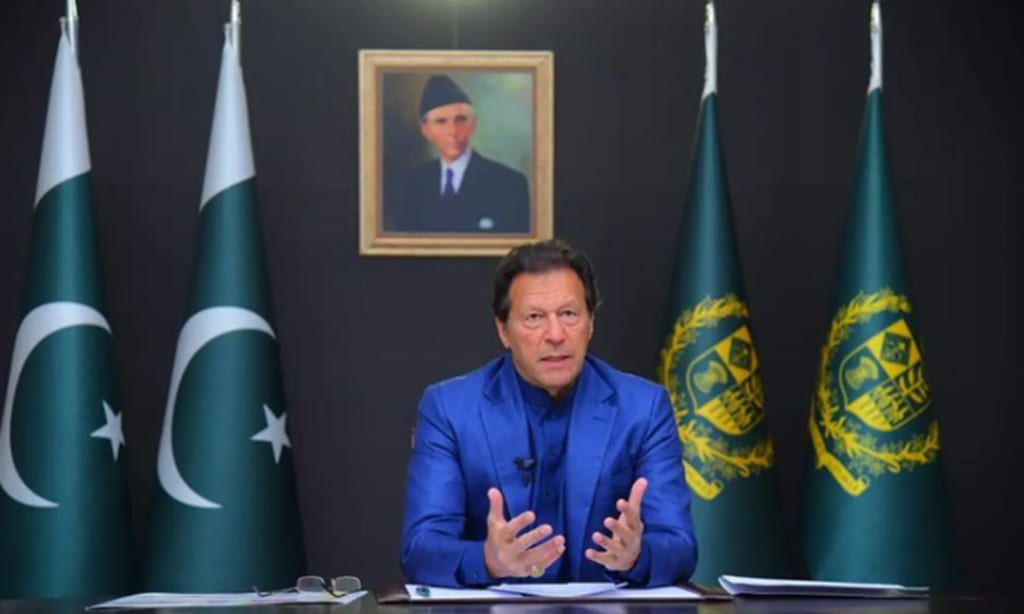Imran Khan
Ex prime minister of Pakistan

Imran Khan, in full Imran Ahmad Khan Niazi, (conceived October 5, 1952, Lahore, Pakistan), Pakistani cricket player, lawmaker, giver, and state leader of Pakistan (2018-22) who turned into a public legend by driving Pakistan's public group to a Cricket World Cup triumph in 1992 and later entered legislative issues as a pundit of government defilement in Pakistan.
Khan was born in Lahore to an affluent Pashtun family. He attended prestigious schools in Pakistan and the United Kingdom, including Aitchison College in Lahore and the Royal Grammar School in Worcester. His family had several accomplished cricket players, including Javed Burki and Majid Khan, his older cousins who were both captains of the Pakistani national team. When Imran Khan was in his teens, he played cricket in Pakistan and the United Kingdom. He continued to play while attending the University of Oxford to study philosophy, politics, and economics. Khan made his debut for Pakistan's national team in 1971, but it wasn't until after he graduated from Oxford in 1976 that he was offered a permanent spot on the team.
Khan was named captain of the Pakistani team in 1982 after establishing himself as an outstanding bowler and all-rounder by the beginning of the 1980s. Khan's athletic ability and great looks made him a superstar in Pakistan and Britain, and his customary appearances at elegant London clubs gave grub to the English newspaper press. When he led Pakistan's team to its first World Cup title in 1992, Khan achieved his greatest athletic success by defeating England in the final. After earning a reputation as one of the greatest cricket players in history, he retired the same year.
After 1992 Khan stayed in the public eye as a humanitarian. He encountered a strict arousing, embracing Sufi otherworldliness and shedding his prior playboy picture. Khan was the primary fundraiser for the Shaukat Khanum Memorial Cancer Hospital, a specialized cancer hospital in Lahore that opened in 1994. This was one of his charitable endeavors. Khan's mother, who had passed away from cancer in 1985, was the name of the hospital.
Passage into legislative issues
After his retirement from cricket, Khan turned into a candid pundit of government blunder and defilement in Pakistan. He established his own ideological group, Pakistan Tehreek-e-Insaf (Pakistan Equity Development; PTI), in 1996. The newly formed party received less than one percent of the vote in the national elections that were held the following year, but it did not win any seats in the National Assembly. On the other hand, it did slightly better in the elections that were held in 2002, winning a single seat that Khan held. Khan insisted that his party's low vote totals were the result of vote rigging. Khan was one of a group of politicians who quit the National Assembly in protest of President Pervez Musharraf's application in the impending official political race. During a crackdown on critics of Musharraf who had declared a state of emergency in November, Khan was briefly detained. In protest of Musharraf's rule, the PTI boycotted the 2008 national elections and condemned the emergency that ended in mid-December.
Khan's populist positions gained support, particularly among young people, despite the PTI's struggles in elections. He opposed the Pakistani government's cooperation with the United States in fighting militants near the Afghan border and continued to criticize Pakistan's economic inequality and corruption. In addition, he launched attacks on Pakistan's political and economic elite, accusing them of being Westernized and out of touch with Pakistan's religious and cultural norms.
Among Khan's works are Warrior Race: Pakistan and A Journey Through the Land of the Tribal Pathans (1993): A Biography of My Life (2011)
Ascension in politics In the months leading up to the legislative elections that were scheduled for the beginning of 2013, Khan and his party held a lot of rallies that drew large crowds. They also got the support of a few old politicians from Pakistan's established parties. A 2012 opinion poll found that Khan was Pakistan's most popular political figure. This was further evidence of Khan's rise in politics.
Khan fell from a platform at a campaign rally just days before May 2013's legislative elections, injuring his head and back. He made a final plea to voters when he appeared on television hours later from his hospital bed. The Pakistan Tehreek-i-Insaf (PTI) won more seats than the Pakistan Muslim League–Nawaz (PML-N), led by Nawaz Sharif, despite the PTI's highest totals to date. Khan said that the PML-N had tampered with the elections. In late 2014, he and other opposition leaders led four months of protests to pressure Sharif to resign after his requests for an investigation were ignored.
Despite the fact that Sharif's family was linked to offshore holdings in the Panama Papers, suspicions of corruption increased after the protests failed to remove him. Khan coordinated another arrangement of fights in late 2016 however canceled them without a second to spare after the High Court consented to open an examination. In 2017, the investigation disqualified Sharif from holding public office and forced him to resign. Khan, on the other hand, was found to have offshore holdings as well, but the Supreme Court did not disqualify him in a separate case.
Races were held the next year, in July 2018. Despite the fact that he had to defend himself against accusations that he was too close to the military establishment, Khan ran on a platform of fighting poverty and corruption. Khan was able to pursue a coalition with independent members of the legislature after the PTI won a majority of seats in the National Assembly. On August 18, he became the prime minister.
Premiership Khan faced an increasing balance-of-payments crisis while serving as prime minister. Despite the expansion of the economy, imports and debt obligations from prior to his term have increased dramatically in recent years, particularly as a result of the China-Pakistan Economic Corridor (CPEC) initiative. The crisis got worse just a few weeks into his tenure as prime minister when the United States withdrew $300 million in promised military aid, claiming that Pakistan had not done enough to stop terrorism. Khan made an effort to first seek aid from "friendly countries" abroad; His decision not to accept a bailout from the International Monetary Fund (IMF) reflected public dissatisfaction with the IMF due to the fact that a dozen previous IMF packages had failed to address Pakistan's macroeconomic issues. After he couldn't get unfamiliar guide on ideal circumstances from different nations, nonetheless, Pakistan presented a solicitation for crisis loaning from the IMF. He kept looking for aid from other countries and eventually got promises of investments from China, Saudi Arabia, and the UAE.
Khan oversaw a number of significant developments in Pakistan's foreign relations in addition to soliciting aid from abroad. The country brought the Taliban to negotiations with the United States with success, resulting in improved relations with the United States and Afghanistan. India launched an air assault on Pakistan for the first time in fifty years in February 2019 as a show of force against militants in Kashmir who had recently staged a suicide attack that killed 40 Indian security personnel, raising concerns of a new conflict between the two countries. Pakistan appeared to avoid escalating the situation and downplayed the impact. Pakistan captured a pilot and shot down two fighter jets when India again entered Pakistani airspace, but the pilot was soon returned to India. Khan launched a campaign of repression against militants following the incident, making a number of arrests, closing a large number of religious schools, and promising to adapt existing laws to international standards.
The country's economic woes were made worse by the COVID-19 pandemic, which began at the beginning of 2020. Khan was more reticent than his critics to support a lockdown. Conversely, the commonplace government in Sindh, constrained by a resistance, rushed to execute a severe lockdown in Spring. In April, Khan ultimately imposed a nationwide lockdown; in May his administration started confining lockdowns to territories with high contamination rates.
In the meantime, Khan continued to face opposition for his close relationship with the military establishment, his crackdown on militants, and the fragile state of the economy. This led to his removal from office and subsequent political activity. The Pakistan Democratic Movement (PDM) was formed in late 2020 by the major opposition parties with the stated objective of increasing civilian government independence from the military establishment. The PDM's rallies and protests demanded Khan's resignation and accused him of being a puppet of the army. In Walk 2021 these gatherings boycotted a demonstration of approval started by Khan's administration, which he endure barely with the backing of his alliance accomplices. Sometime thereafter Khan dropped out with the tactical foundation after a bombed endeavor by Khan to impact its top posts. In March 2022, the opposition took the initiative to hold its own vote of confidence as dissatisfaction with persistent inflation grew; A number of PTI members defected, as did key allies who left the government coalition. Khan became the first prime minister in Pakistani history to be removed by a no-confidence vote after the vote was held on April 10.
The economy just demolished under another administration drove by Shehbaz Sharif and the PML-N, making way for a striking rebound by the PTI months after it was removed. In the July 2022 legislative elections, the PTI won 15 of the 20 seats in Punjab province, Pakistan's largest province and a traditional PML-N stronghold. However, Khan faced significant obstacles as he attempted to ride his momentum in rallies held throughout the country. In August, he faced criticism for a speech in which he threatened to sue a judge and police officers in Islamabad. He was later indicted for that speech, the first of a series of charges that would follow in the months to come. After the election commission stated that he was responsible for corrupt practices, he was temporarily prohibited from holding public office in October. While heading a dissent caravan from the city of Lahore to Islamabad in November, he was shot in the leg in a clear death endeavor.
About the Creator
Mehak Abdul Rehman
You get to read criminal, educational story's, more information and more interesting storys and there are gonna be more fun and amazing story's gonna be published and please I need tips and plz support me in it subscribe plz like SHARE.






Comments
Mehak Abdul Rehman is not accepting comments at the moment
Want to show your support? Send them a one-off tip.